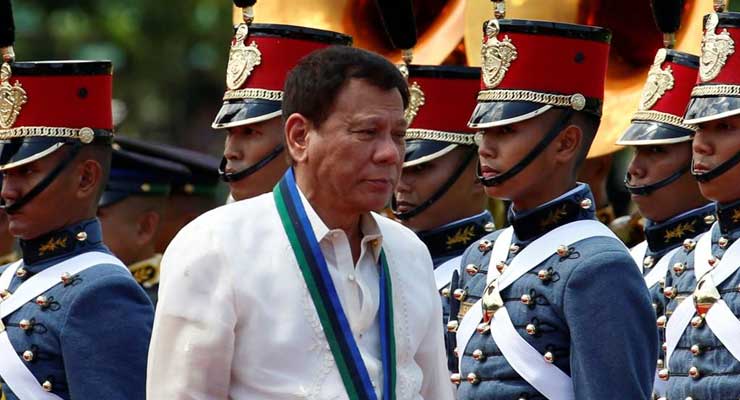
Sometimes blips on the diplomatic radar far away can be prescient of larger things to come, closer to home. In the Philippines, things are happening, and they’re worth taking note of for our alliance, geopolitics, and the psychology of a country’s president.
According to Fujisankei Japanese language TV news last week, Philippine President Duterte was welcomed in Tokyo with a Big Show – one better than most heads of state. As well as the usual banquets and Emperor bowing, President Duterte was afforded helicopter transports, a Coast Guard anti-terrorism display, and effusive toasts with many a kampai from a visibly flushed Prime Minister Abe. Why all the fuss for a country whose main exports to Japan are bananas and nightclub workers? Perhaps he was being intentionally personally flattered by the Japanese Foreign Ministry – never a sloppy institution. He was met with equal aplomb days before in Beijing, and promised $24 B. in foreign investment.
President Dutarte is a colorful chap. A lawyer and long time mayor of the blighted Southern city of Davao, he comfortably won the Philippine Presidential election in May. His law and order policies include inciting open-season hunting of drug dealers – costing 4,000 lives so far, and spectacular misogyny: his opinions on rape and Why wasn’t I offered a place in the rape-line? – type ad-libs established him as “Tough Talking” – which has become a journalistic cliché to describe him. His tough talking diplomatic atrocities continue apace. He told President Obama to “Go to hell” recently and abused the Pope.
Enter the islands. The disputed Spratly Islands in the South China Sea have six international claimants, a record, including the Philippines and China. The Philippines recently won legal ownership of them under the UN Convention of the Laws of the Sea (UNCLOS) in The Hague, giving some leverage to Dutarte’s trip to Beijing. China is the big guy in the neighborhood which, as an expansionist geopolitical gambit, has taken to artificially developing various Spratley fly-spec sized reefs into military bases with red flags, calling them “Chinese Islands.”
Duterte’s psychology plays a part here, and his hostility towards the United States seems to be entirely destructive, but narcissists never forget a slight or a feud. At press conference in Tokyo Mr. Dutarte complained about difficulties he experienced getting a U.S. visa years ago. He says he wants all foreign troops out of his country smartly in his own Asian pivot to China. His mental health is no secret.
The Manila Times and Manila’s ABS-CBN news understanding-duterte-what-a-psych-report-says quote several psychiatrists, one whom analyzed him pursuant to his divorce, and diagnosed him with Narcissistic Personality Disorder. It is an uncommon mental illness which various respected doctors have also diagnosed Donald Trump as a classic case. One was the Dean of Harvard Medical School, Dr. Flier, who tweeted Mr. Trump “defines” the disorder.
As with Trump, it is hard to sort through the feuds and bombast to know his actual agenda: is it foreign policy by pique, or a canny geopolitical gambit to play the U.S. against the Chinese in the South China Sea? It is hard to tell, because like Mr. Trump’s, President Dutarte’s statements are often contradictory. Will he honor the Philippines’ 70 year-old treaty alliance with the U.S., or is the satisfaction of getting to play “tough” with the big boys his method of self-aggrandizement?
How this impacts America is more subtle. The presidency of a developing country in Asia has little influence here. But with a wider view, a psychological perspective, a narcissist in office can be a dangerous and unpredictable thing.
Economists and Business Insider seem to think so. His “tough” crackdown on crime is harming the economy and critically, non-Chinese investment from abroad. The Philippine Stock Exchange (PSE) has witnessed a general decline (after a short boost) since his win.
That’s the problem with electing an aggressive, charismatic narcissist: it might feel good, but it ends in disaster. The psychology of our politicians is something which is rarely considered next to their physical health, a dangerous omission given a president rules with his head rather than his hand size, his testosterone numbers, or cholesterol levels.
The Filipino people elected a charismatic and unpredictable authoritarian. He delivered economic strife, a bloody free-for-all shooting disaster wrecking civilized rule of law, and the rubbishing of their country’s once respectable reputation. It threatens – as President Dutarte threatens – the only security guarantee the Philippines have – their relationship with us. Could electing a narcissist here be a similar disaster?
Leave a Reply